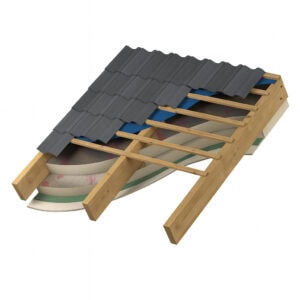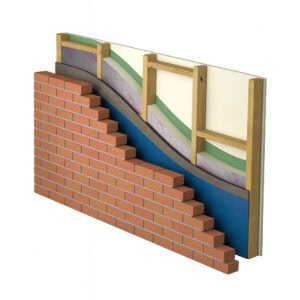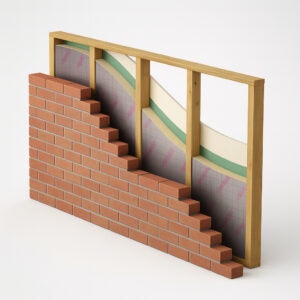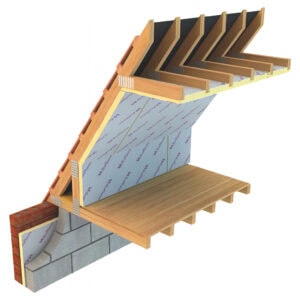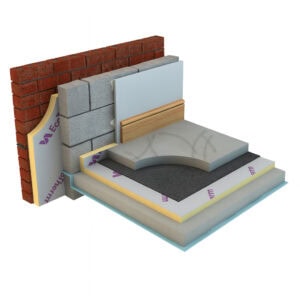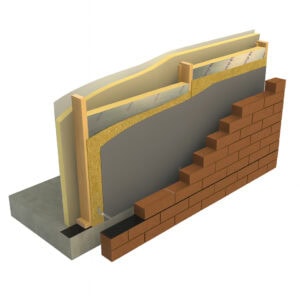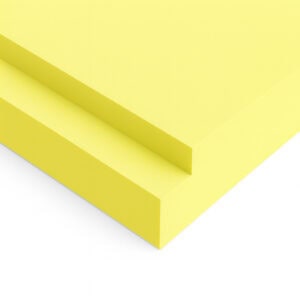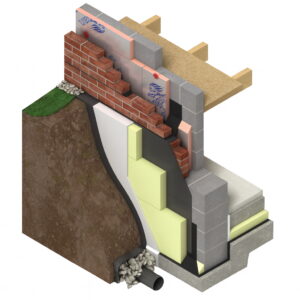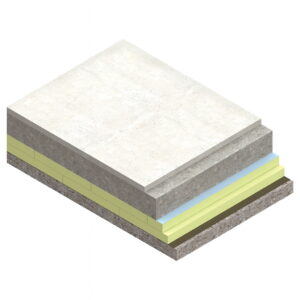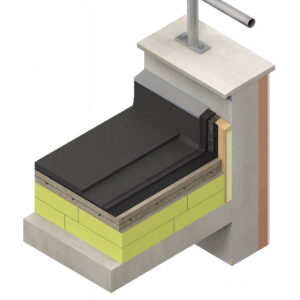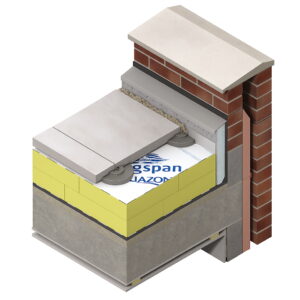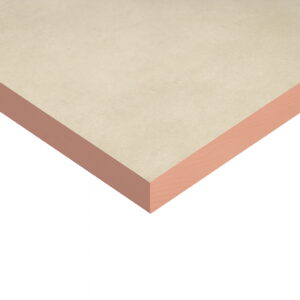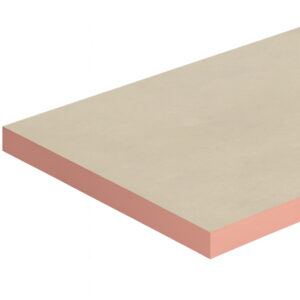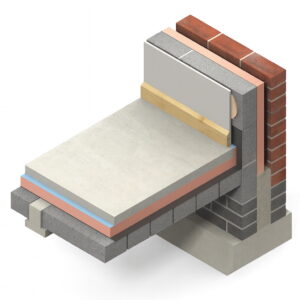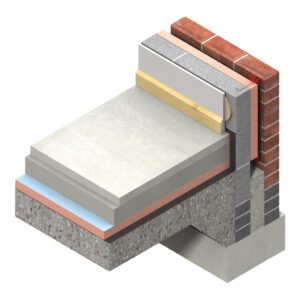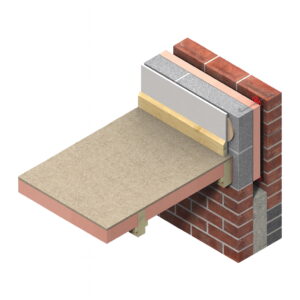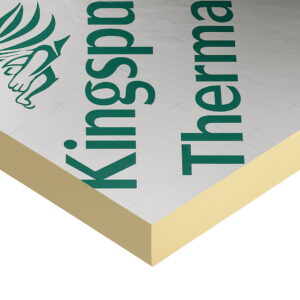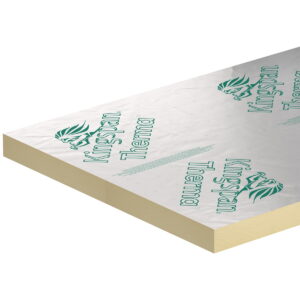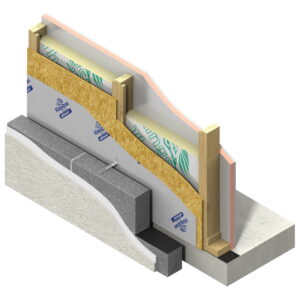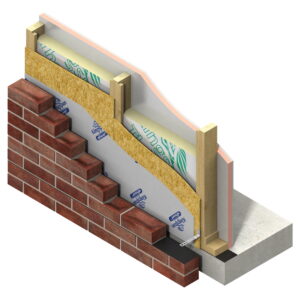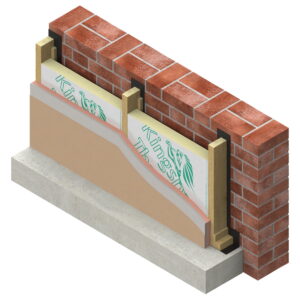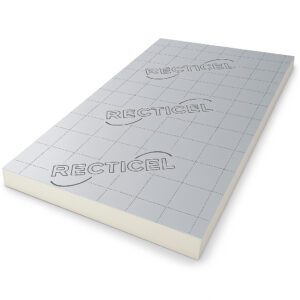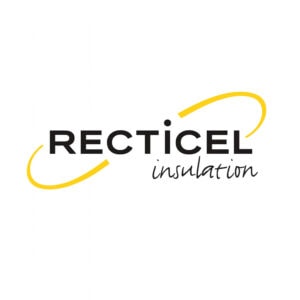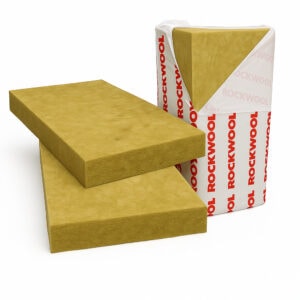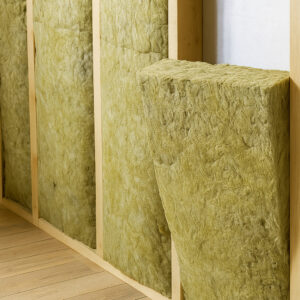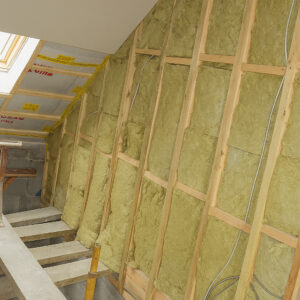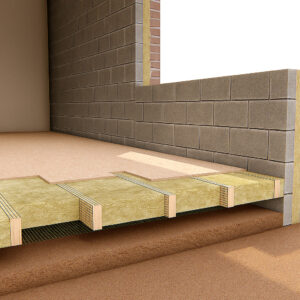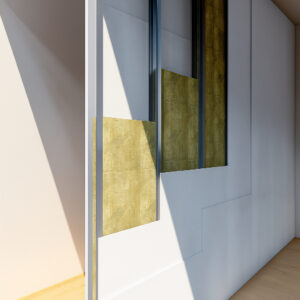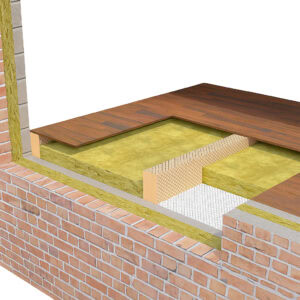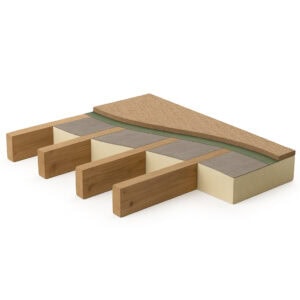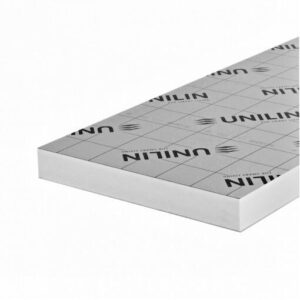Suspended Floor Insulation
Properly fitted suspended floor insulation helps keep interior spaces warm. It is made for use in any buildings with timber or beam-and-block floors, including modern buildings and period homes. These floors are exposed to an air void beneath them and can lose up to 15% of a property’s heat if left uninsulated.
What Is Suspended Floor Insulation?
Also known as underflow insulation for timber or beam-and-block floors, suspended flooring insulation is positioned between the joists of a suspended floor. These floors have an air gap underneath that causes them to lose heat.
Without insulation, that empty space acts like a cold bridge (a pathway that lets heat escape), causing draughts to rise into the room above. When you fit insulation underneath or between joists, the insulation forms a barrier that keeps heat inside.
What Is Suspended Floor Insulation Used For?
Underfloor insulation for timber floors effectively reduces the amount of heat lost through suspended floors. It is ideal for:
- For installation between joists in older buildings with timber floors.
- New builds that aim to fulfil Building Regulations for energy performance.
- Retrofit projects where you want more comfort and efficiency, but don’t want to replace the whole floor.
Types Of Suspended Floor Insulation
Insulation for suspended floors is available in two main types: rigid panels and soft insulation slabs. Both options are available in our suspended floor insulation collection.
Made from materials like PIR, XPS, or EPS for lighter applications where cost-efficiency matters, rigid boards offer excellent compressive strength and thermal efficiency. They are perfect for floors that need to handle higher loads or where a precise fit is required between joists.
Soft Insulation Slabs or Rolls
Soft insulation slabs and rolls are lightweight, flexible and quick to install. Usually made from glass or mineral wool, they fit tightly between joists. This insulation is excellent at reducing heat loss and sound transfer and is therefore ideal for uneven or older timber floors.
Both underfloor insulation suspended floor boards and flexible slabs deliver reliable, long-term performance. Choose rigid boards for strength and stability, or soft slabs and rolls for flexibility and sound control.
Benefits Of Insulation For Suspended Flooring
Installing suspended floor insulation offers several advantages:
- Lower energy bills.
- Increased comfort.
- Sound absorption.
- Moisture protection.
- Environmentally friendly.
Why Choose Our Underfloor Insulation For Timber Floors?
We supply trusted brands that deliver lasting performance across all suspended floor applications.
We provide enough variety to meet various flooring requirements. Whatever type of suspended timber floor insulation you require, you will find it at our store.
Give your floors the upgrade they deserve with high-quality suspended floor insulation from Insulation Wholesale. We deliver within 1-3 working days across the UK, unless stated otherwise on the product page or during checkout. Browse our full range of rigid insulation panels and flexible slabs.
FAQ
What thickness insulation for suspended floor?
The right floor insulation suspended floor setup, including thickness, will depend on the type of insulation used, target U-value, floor design, and load requirements. In most cases, Building Regulations call for 100mm to 150mm of between-joist insulation. Analyse the building spec and check the product’s R-value for optimal performance.
How to install suspended floor insulation
- Step 1: Remove your floorboards. Check for signs of moisture or mould and replace any that are affected. If insulating an older property, lay a breathable membrane underneath the insulation. This will help block draughts while boosting ventilation.
- Step 2: Fit your suspended floor insulation between the joists. Do not compress soft insulation, as this can reduce its effectiveness.
- Step 3: Secure the insulation using support wires, battens or netting.
- Step 4: Add a vapour control layer if it’s required, then replace the floorboards. Ensure the underfloor void remains well ventilated to prevent condensation and timber decay
How much does suspended floor insulation cost?
Suspended floor insulation prices vary based on coverage per roll or board and the insulation’s thermal rating. Mineral wool generally goes for £20–£30 per roll, while rigid PIR boards range between £25 and £50 per sheet.
For the best value and trade-quality materials, shop with Insulation Wholesale, where we combine competitive pricing with reliable nationwide delivery.
Showing 1–32 of 188 results
-
100mm Celotex GA4100 PIR Insulation Board 2400mm x 1200mm (8′ x 4′) 2.88m2
100mm Celotex GA4100 is a polyisocyanurate (PIR) insulation core with composite aluminium foil facings on both sides. Celotex is a multi-purpose insulation board suitable for use in pitched roofs, ceilings, floors and walls.
£26.83£32.20 Ex VATInc VAT£9.32£11.18 Per M2 Add to cart -
100mm Ecotherm Eco-Versal Rigid PIR Insulation Board 2400mm x 1200mm (8′ x 4′) 2.88m2
100mm Ecotherm Eco-Versal is a polyisocyanurate (PIR) insulation core with composite aluminium foil facings on both sides. Ecotherm Eco-Versal is a multi-purpose insulation board suitable for use in pitched roofs, ceilings, floors and walls.
£27.15£32.58 Ex VATInc VAT£9.43£11.32 Per M2 Add to cart -
100mm Expanded Polystyrene EPS100 Insulation Board 2400mm x 1200mm (8′ x 4′) Pack of 24 (69.12m2)
100mm EPS100, often known as Expanded Polystyrene, is a lightweight foam product produced from tiny polystyrene beads. Due to its high thermal value and simplicity of usage, it is commonly used as one of the most favoured insulation materials in construction.
£420.25£504.30 Ex VATInc VAT£6.08£7.30 Per M2 Add to cart -
100mm Expanded Polystyrene EPS150 Floor Insulation Board 2400mm x 1200mm (8′ x 4′) Pack of 6 (17.28m2)
100mm EPS150, often known as Expanded Polystyrene, is a lightweight foam product produced from tiny polystyrene beads. Due to its high thermal value and simplicity of usage, it is commonly used as one of the most favoured insulation materials in construction.
£159.72£191.66 Ex VATInc VAT£9.24£11.09 Per M2 Add to cart -
100mm Expanded Polystyrene EPS200 Floor Insulation Board 2400mm x 1200mm (8′ x 4′) Pack of 6 (17.28m2)
100mm EPS200, often known as Expanded Polystyrene, is a lightweight foam product produced from tiny polystyrene beads. Due to its high thermal value and simplicity of usage, it is commonly used as one of the most favoured insulation materials in construction.
£282.11£338.53 Ex VATInc VAT£16.33£19.60 Per M2 Add to cart -
100mm Expanded Polystyrene EPS250 Floor Insulation Board 2400mm x 1200mm (8′ x 4′) Pack of 6 (17.28m2)
100mm EPS250, often known as Expanded Polystyrene, is a lightweight foam product produced from tiny polystyrene beads. Due to its high thermal value and simplicity of usage, it is commonly used as one of the most favoured insulation materials in construction.
£374.89£449.87 Ex VATInc VAT£21.70£26.04 Per M2 Add to cart -
100mm Expanded Polystyrene EPS70 Insulation Board 2400mm x 1200mm (8′ x 4′) 2.88m2 (Pack of 6)
100mm EPS70, often known as Expanded Polystyrene, is a lightweight foam product produced from tiny polystyrene beads. Due to its high thermal value and simplicity of usage, it is commonly used as one of the most favoured insulation materials in construction.
£93.00£111.60 Ex VATInc VAT£5.38£6.46 Per M2 Add to cart -
100mm Kingspan GreenGuard GG300 R Rigid Extruded Polystyrene Insulation Board 1250mm x 600mm Pack of 4 (3.00m2)
100mm Kingspan GreenGuard GG300 is a high performance rigid extruded polystyrene insulation. It is used to insulate inverted roofs, basements, car park decks, and heavy-duty commercial, industrial and cold store flooring offering a thermal conductivities as low as 0.033 W/mK.
£54.49£65.39 Ex VATInc VAT£18.16£21.79 Per M2 Add to cart -
100mm Kingspan Kooltherm K103 Insulation Floorboard 2400mm x 1200mm Pack of 3 (8.64m2)
100mm Kooltherm K103 is a premium phenolic core floor insulation solution, designed to deliver exceptional performance with solid concrete or suspended timber floors.
£289.93£347.92 Ex VATInc VAT£33.56£40.27 Per M2 Add to cart -
100mm Kingspan Therma TP10 / TF70 / TW55 PIR Insulation Board 2400mm x 1200mm (8′ x 4′) Pack of 3 (8.64m2)
All three models 100mm Kingspan Therma PIR Insulation Board:
- 100mm Thermapitch TP10
- 100mm Thermafloor TF70
- 100mm Thermawall TW55
share the same high-performance PIR core and low-emissivity foil facings, offering excellent thermal efficiency and easy installation. Although labeled differently, these boards share identical technical specifications.
£138.93£166.72 Ex VATInc VAT£16.08£19.30 Per M2 Add to cart -
100mm Recticel Eurothane GP PIR Insulation Board 2400mm x 1200mm (8′ x 4′) 2.88m2
100mm Recticel Eurothane GP is a polyisocyanurate (PIR) insulation core with composite aluminium foil facings on both sides. Recticel is a multi-purpose insulation board suitable for use in pitched roofs, ceilings, floors and walls.
£26.83£32.20 Ex VATInc VAT£9.32£11.18 Per M2 Add to cart -
100mm Rockwool Flexi Slab Acoustic Insulation 1200mm x 600mm 4.32m2 Pack
100mm Rockwool Flexi has been designed as a multi-use, dual-purpose acoustic and thermal mineral wool insulation with a unique flexible edge along one side. It is suitable for use all over the home, in pitched roof rafters, framed external walls, internal partitions, intermediate floors, separating walls and floors, and timber suspended ground floors.
£40.41£48.49 Ex VATInc VAT£9.35£11.22 Per m2 Add to cart -
100mm Rockwool RWA45 Acoustic Insulation Slab 1200 x 600mm 2.88m2 Pack
100mm Rockwool RWA45 has been developed for thermal, acoustic and fire performance in a range of construction types. It is suitable for applications on partition walls, ceilings, floors and roofs.
£21.39£25.67 Ex VATInc VAT£7.43£8.92 Per m2 Add to cart -
110mm Celotex XR4110 PIR Insulation Board 2400mm x 1200mm (8′ x 4′) 2.88m2
110mm Celotex XR4110 is a polyisocyanurate (PIR) insulation core with composite aluminium foil facings on both sides. Celotex is a multi-purpose insulation board suitable for use in pitched roofs, ceilings, floors and walls.
£32.42£38.90 Ex VATInc VAT£11.26£13.51 Per M2 Add to cart -
110mm Ecotherm Eco-Versal Rigid PIR Insulation Board 2400mm x 1200mm (8′ x 4′) 2.88m2
110mm Ecotherm Eco-Versal is a polyisocyanurate (PIR) insulation core with composite aluminium foil facings on both sides. Ecotherm Eco-Versal is a multi-purpose insulation board suitable for use in pitched roofs, ceilings, floors and walls.
£33.97£40.76 Ex VATInc VAT£11.80£14.16 Per M2 Add to cart -
110mm Recticel Eurothane GP PIR Insulation Board 2400mm x 1200mm (8′ x 4′) 2.88m2
110mm Recticel Eurothane GP is a polyisocyanurate (PIR) insulation core with composite aluminium foil facings on both sides. Recticel is a multi-purpose insulation board suitable for use in pitched roofs, ceilings, floors and walls.
£32.42£38.90 Ex VATInc VAT£11.26£13.51 Per M2 Add to cart -
110mm Unilin Thin-R PIR Insulation Board 2400mm x 1200mm (8′ x 4′) Pallet of 21 (60.48m2)
110mm Unilin Thin-R PIR insulation is a foil faced, high-performance insulation solution that offers exceptional thermal efficiency and durability. This polyisocyanurate insulation board, formerly known as Xtratherm, is ideal for a range of applications, such as floors, pitched roofs, and walls.
POA Get a quote -
120mm Celotex XR4120 PIR Insulation Board 2400mm x 1200mm (8′ x 4′) 2.88m2
120mm Celotex XR4120 is a polyisocyanurate (PIR) insulation core with composite aluminium foil facings on both sides. Celotex is a multi-purpose insulation board suitable for use in pitched roofs, ceilings, floors and walls.
£33.04£39.65 Ex VATInc VAT£11.47£13.76 Per M2 Add to cart -
120mm Ecotherm Eco-Versal Rigid PIR Insulation Board 2400mm x 1200mm (8′ x 4′) 2.88m2
120mm Ecotherm Eco-Versal is a polyisocyanurate (PIR) insulation core with composite aluminium foil facings on both sides. Ecotherm Eco-Versal is a multi-purpose insulation board suitable for use in pitched roofs, ceilings, floors and walls.
£33.18£39.82 Ex VATInc VAT£11.52£13.82 Per M2 Add to cart -
120mm Kingspan GreenGuard GG300 R Rigid Extruded Polystyrene Insulation Board 1250mm x 600mm Pack of 3 (2.25m2)
120mm Kingspan GreenGuard GG300 is a high performance rigid extruded polystyrene insulation. It is used to insulate inverted roofs, basements, car park decks, and heavy-duty commercial, industrial and cold store flooring offering a thermal conductivities as low as 0.033 W/m·K
£49.44£59.33 Ex VATInc VAT£21.97£26.36 Per M2 Add to cart -
120mm Kingspan Kooltherm K103 Insulation Floorboard 2400mm x1200mm Pack of 2 (5.76m2)
120mm Kooltherm K103 is a premium phenolic core floor insulation solution, designed to deliver exceptional performance with solid concrete or suspended timber floors.
£243.84£292.61 Ex VATInc VAT£42.33£50.80 Per M2 Add to cart -
120mm Kingspan Therma TP10 / TF70 / TW55 PIR Insulation Board 2400mm x 1200mm (8′ x 4′) Pack of 2 (5.76m2)
All three models 120mm Kingspan Therma PIR Insulation Board:
- 120mm Thermapitch TP10
- 120mm Thermafloor TF70
- 120mm Thermawall TW55
share the same high-performance PIR core and low-emissivity foil facings, offering excellent thermal efficiency and easy installation. Although labeled differently, these boards share identical technical specifications.
£111.30£133.56 Ex VATInc VAT£19.32£23.18 Per M2 Add to cart -
120mm Recticel Eurothane GP PIR Insulation Board 2400mm x 1200mm (8′ x 4′) 2.88m2
120mm Recticel Eurothane GP is a polyisocyanurate (PIR) insulation core with composite aluminium foil facings on both sides. Recticel is a multi-purpose insulation board suitable for use in pitched roofs, ceilings, floors and walls.
£33.04£39.65 Ex VATInc VAT£11.47£13.76 Per M2 Add to cart -
125mm Kingspan Therma TP10 / TF70 / TW55 PIR Insulation Board 2400mm x 1200mm (8′ x 4′) Pack of 2 (5.76m2)
All three models 20mm Kingspan Therma PIR Insulation Board:
- 125mm Thermapitch TP10
- 125mm Thermafloor TF70
- 125mm Thermawall TW55
share the same high-performance PIR core and low-emissivity foil facings, offering excellent thermal efficiency and easy installation. Although labeled differently, these boards share identical technical specifications.
£128.56£154.27 Ex VATInc VAT£22.32£26.78 Per M2 Add to cart -
130mm Celotex XR4130 PIR Insulation Board 2400mm x 1200mm (8′ x 4′) 2.88m2
130mm Celotex XR4130 is a polyisocyanurate (PIR) insulation core with composite aluminium foil facings on both sides. Celotex is a multi-purpose insulation board suitable for use in pitched roofs, ceilings, floors and walls.
£39.41£47.29 Ex VATInc VAT£13.68£16.42 Per M2 Add to cart -
130mm Ecotherm Eco-Versal Rigid PIR Insulation Board 2400mm x 1200mm (8′ x 4′) 2.88m2
130mm Ecotherm Eco-Versal is a polyisocyanurate (PIR) insulation core with composite aluminium foil facings on both sides. Ecotherm Eco-Versal is a multi-purpose insulation board suitable for use in pitched roofs, ceilings, floors and walls.
£40.21£48.25 Ex VATInc VAT£13.96£16.75 Per M2 Add to cart -
130mm Expanded Polystyrene EPS250 Floor Insulation Board 2400mm x 1200mm (8′ x 4′) Pack of 4 (11.52m2)
130mm EPS250, often known as Expanded Polystyrene, is a lightweight foam product produced from tiny polystyrene beads. Due to its high thermal value and simplicity of usage, it is commonly used as one of the most favoured insulation materials in construction.
£324.90£389.88 Ex VATInc VAT£28.20£33.84 Per M2 Add to cart -
130mm Recticel Eurothane GP PIR Insulation Board 2400mm x 1200mm (8′ x 4′) 2.88m2
130mm Recticel Eurothane GP is a polyisocyanurate (PIR) insulation core with composite aluminium foil facings on both sides. Recticel is a multi-purpose insulation board suitable for use in pitched roofs, ceilings, floors and walls.
£39.44£47.33 Ex VATInc VAT£13.69£16.43 Per M2 Add to cart -
140mm Kingspan Kooltherm K103 Insulation Floorboard 2400mm x1200mm Pack of 2 (5.76m2)
140mm Kooltherm K103 is a premium phenolic core floor insulation solution, designed to deliver exceptional performance with solid concrete or suspended timber floors.
£280.84£337.01 Ex VATInc VAT£48.76£58.51 Per M2 Add to cart -
140mm Kingspan Therma TP10 / TF70 / TW55 PIR Insulation Board 2400mm x 1200mm (8′ x 4′) Pack of 2 (5.76m2)
All three models 140mm Kingspan Therma PIR Insulation Board:
- 140mm Thermapitch TP10
- 140mm Thermafloor TF70
- 140mm Thermawall TW55
share the same high-performance PIR core and low-emissivity foil facings, offering excellent thermal efficiency and easy installation. Although labeled differently, these boards share identical technical specifications.
£139.15£166.98 Ex VATInc VAT£24.16£28.99 Per M2 Add to cart -
140mm Recticel Eurothane GP PIR Insulation Board 2400mm x 1200mm (8′ x 4′) 2.88m2
140mm Recticel Eurothane GP is a polyisocyanurate (PIR) insulation core with composite aluminium foil facings on both sides. Recticel is a multi-purpose insulation board suitable for use in pitched roofs, ceilings, floors and walls.
£40.05£48.06 Ex VATInc VAT£13.91£16.69 Per M2 Add to cart -
140mm Rockwool Flexi Slab Acoustic Insulation 1200mm x 600mm 2.88m2 Pack
140mm Rockwool Flexi has been designed as a multi-use, dual-purpose acoustic and thermal mineral wool insulation with a unique flexible edge along one side. It is suitable for use all over the home, in pitched roof rafters, framed external walls, internal partitions, intermediate floors, separating walls and floors, and timber suspended ground floors.
£37.03£44.44 Ex VATInc VAT£12.86£15.43 Per m2 Add to cart

